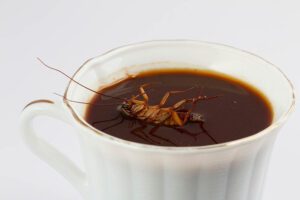Shocking Coffee Fact: Does Your Brew Contain Cockroaches?

Do You Know the Fact That Coffee Has 5% Cockroaches?
Coffee lovers, brace yourselves! You may have heard rumors that your beloved morning brew contains a surprising, even shocking, ingredient—cockroaches. But is there any truth to this claim? Let’s dive into the science behind it and uncover the reality.
Where Does This Claim Come From?
The claim that coffee contains about 5% cockroaches comes from studies on food contamination. Insects, including cockroaches, can sometimes be found in stored food products like grains, chocolate, and yes, coffee beans. The U.S. Food and Drug Administration (FDA) allows a certain level of “natural defects” in food, meaning small amounts of insect fragments, mold, or rodent hairs are considered unavoidable in processed products.

How Do Cockroaches End Up in Coffee?
Coffee beans are stored in large warehouses before being roasted and ground into the coffee powder we use. During storage, cockroaches and other pests can infest the beans. Since it is difficult to remove them completely, they may end up being ground along with the coffee beans, especially in pre-ground coffee varieties.
Does That Mean You’re Drinking Cockroaches?
The 5% figure is not a strict rule, but it’s true that trace amounts of insects can be present in coffee, especially pre-ground coffee. However, this does not mean that every cup contains cockroaches. The roasting process destroys most contaminants, and many premium coffee brands take extra steps to minimize such contamination.
Should You Be Worried?
For most people, the presence of insect fragments in coffee is harmless. However, individuals with allergies, especially to shellfish, may experience allergic reactions since cockroaches share similar proteins with shellfish like shrimp and crabs. If you have an allergy, consider switching to whole bean coffee and grinding it yourself for a cleaner cup.
How to Avoid Cockroach-Contaminated Coffee
Buy whole bean coffee – Grinding fresh coffee at home reduces the risk of contamination.
Choose high-quality brands – Reputable brands have better quality control.
Store coffee properly – Keep beans in airtight containers to avoid insect infestations.
While it may be unsettling to think about, the truth is that most processed foods contain tiny amounts of contaminants. The presence of insect fragments in coffee is more of a natural occurrence than a deliberate ingredient. If you love coffee, don’t let this fact stop you—just be mindful of what you’re consuming!
Would you still drink your favorite cup of coffee after learning this? Let us know in the comments!








